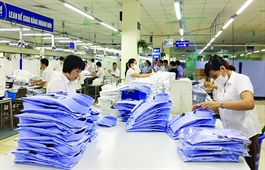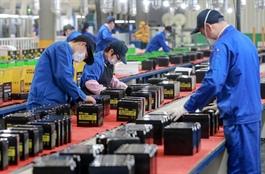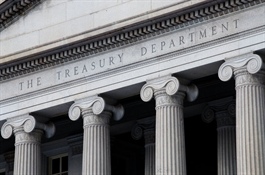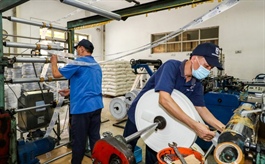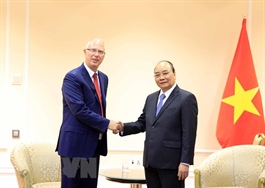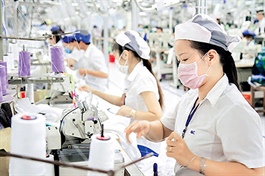Vietnam's economy loses US$37 billion on Covid-19
Vietnam's economy loses US$37 billion on Covid-19
The local economy should have had expanded by over 7% in the 2020-2021 period, but instead, it settled at 2.91% in 2020 and would achieve an estimated 2.5% this year.
The Covid-19 pandemic in the past two years has caused losses of VND847 trillion (U$37 billion) for the local economy.
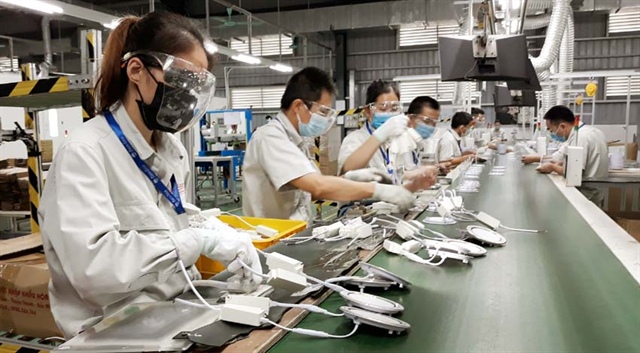
Electronics production for export at Rang Dong Company. Photo: The Hanoi Times |
Vice-Chairman of the Party Central Committee’s Economic Commission Nguyen Thanh Phong revealed the figure at a business forum on December 5.
According to Phong, without the pandemic, the economy would have expanded by 7% for the past two years. However, in fact, the country’s GDP expanded only 2.91% in 2020 and an estimated 2.5% this year.
This resulted in losses of VND160 trillion ($7 billion) in 2020 and VND346 trillion (15.1 billion) in 2021, or around VND507 trillion ($22.2 billion) according to the purchasing power of 2010, and VND847 trillion ($37 billion) in current purchasing power.
“Stimulus packages, therefore, are needed to push for recovery, especially in four driving forces of investment, exports, domestic consumption, and digital transformation,” he said.
“The current forces to boost growth mainly come from investment for the recovery of the demand side, and stimulating domestic consumption to aid the supply side,” Phong suggested.
In this regard, Chairman of the Economic Committee under the National Assembly Vu Hong Thanh expected the upcoming recovery program to be sufficient in size and scale, but more importantly, to be implemented in a timely manner and in harmony with other macro-policies.
“Only fields that have the potential for recovery in the post-pandemic and with high absorption capability would benefit from these programs,” said Thanh, noting this would provide the much-needed boost for the economy and prevent possible wastes.
Regarding this issue, Vice Principal of the National Economics University Hoang Van Cuong said the Government should take into account the absorption capability of the economy before drafting a new support program.
Cuong referred to the slow disbursement of public funds, at around 70% of the year’s estimate, or credit growth at a lower-than-expected rate of just over 8%, below the 12% target.
To accelerate public investment, Cuong suggested the Government further encourage the private sector to participate in public infrastructure projects development.
For credit expansion, he noted the disbursement of loans should be based on business contracts, instead of guarantee assets.
“The Government should use public funds to promote economic activities to support sustainable development in the recovery phase. In this context, the recovery program should be in close association with the ongoing economic restructuring plan,” Cuong said.
From the perspective of the business community, Chairman of the Vietnam Young Entrepreneurs Association (VYEA) Dang Hong Anh expected the NA to carry out supervision activities to ensure the financial support was focused on production activities, instead of in risky fields such as real estate or the stock market.
Central bank may further expand credit quota in December
At the event, Vice Governor of the State Bank of Vietnam Pham Thanh Ha said the central bank set the credit growth target of 12% for this year, but noted such a rate is not fixed and could be adjusted according to the actual situation.
By late November, the credit growth expanded by over 10%, and remains on track to reach the year’s target, Ha noted.
While the SBV has already expanded credit quotas for banks that have reached their limits, Ha noted a similar move may come in December, if needed.
“The SBV’s policy management is aimed at ensuring liquidity for the economy, banks, and businesses,” Ha said.
According to Ha, for the past two years, the SBV has been focusing on providing sufficient capital for the economy by purchasing nearly $25 billion for the past two years.
Meanwhile, the SBV has cut policy rates three times in 2020 by a combined 1.5-2 percentage points, which put the average lending rates at 1.77 percentage points lower compared to early 2020.
A recent report from the BIDV Securities Company (BSC) suggested a number of banks have been given higher credit quotas, including TPBank with the largest expansion of 23.4% this year from the previous 17.4%. Other banks that have their credit quota expanded by over 20% for this year include Techcombank (22.1%), MSB (22%), and Military Bank (21%).
Out of the four major state-run banks (Vietcombank, Vietinbank, BIDV, and Agribank), Vietcombank has the highest credit quota of 15%.





